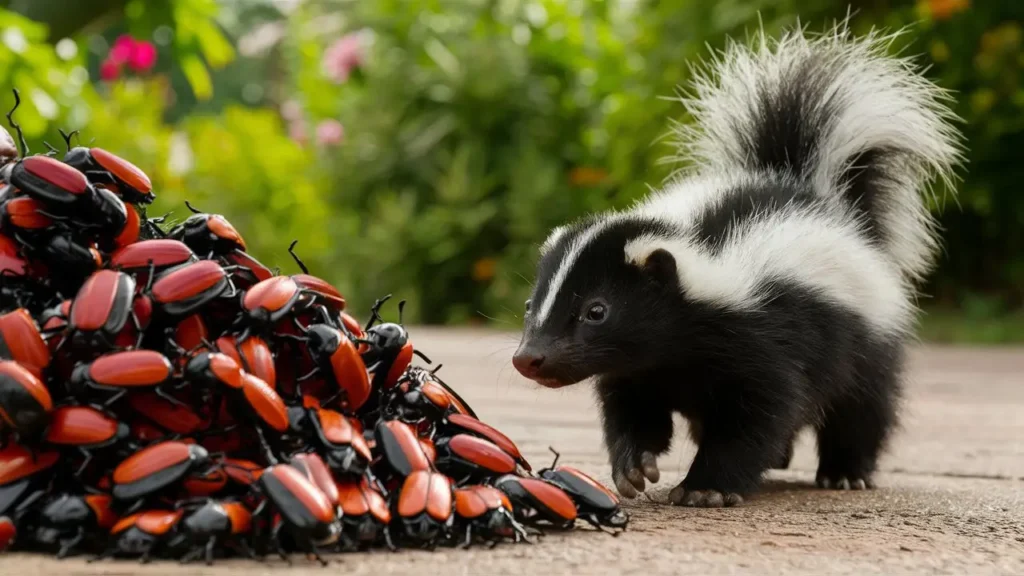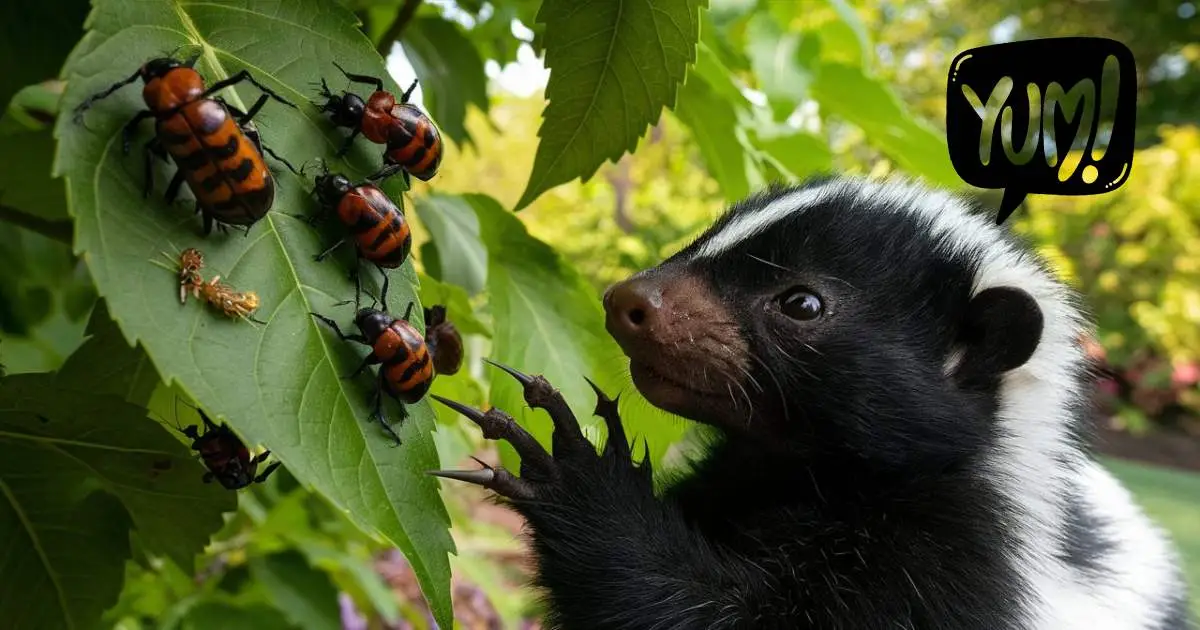Do Skunks Eat Japanese Beetles?
Last updated on September 30th, 2024 at 02:11 am
Do skunks eat Japanese beetles? Yes! From my research and experience with pet skunks, I’ve learned that these beetles are a tasty treat for them. Japanese beetles can cause a lot of trouble for gardeners, but skunks help by eating them. Keep reading to find out how skunks help control these pests and protect your plants.
What Are Japanese Beetles?
Curious minds often wonder about the dietary habits of skunks and whether they snack on pesky garden invaders like Japanese beetles. As we delve into the world of skunks, their eating preferences provide interesting insights into natural pest control. But first, let’s explore what Japanese beetles are and why they are significant in the ecosystem.
Understanding Japanese Beetles
Japanese beetles (Popillia japonica) are invasive pests notorious for damaging gardens, crops, and landscapes. Originating from Japan, these beetles have become widespread in the United States, causing frustration for many gardeners and farmers.
- Size and Appearance: Japanese beetles are small, about 0.6 inches long, with metallic green bodies and copper-colored wings.
- Feeding Habits: They feed on a wide variety of plants, munching on leaves, flowers, and over 300 species of plants.
- Reproduction: Females lay eggs in the soil during summer, which develop into grubs that can damage lawns.
As gardeners battle against these leaf-munching invaders, they seek natural predators to help control the population. Enter skunks, which may have an appetite for these beetles. Understanding the role of skunks in managing Japanese beetle populations can offer an eco-friendly solution to this agricultural challenge.
Skunks And Japanese Beetles
Do skunks eat Japanese Beetles? This question sparks curiosity among many. Skunks, known for their distinctive black and white fur, have a diet that surprises some. They feast on various pests, playing a crucial role in controlling their populations. Japanese Beetles, on the other hand, are notorious for damaging plants. They feast on leaves, flowers, and fruits, leaving a trail of destruction. Let’s dive into the fascinating world of Skunks and Japanese Beetles to uncover the truth behind their interaction.

Gardener’s Perspective
Many gardeners face challenges when it comes to keeping their plants safe from pests like Japanese beetles. These beetles love to munch on leaves and flowers, which can make a beautiful garden look sad and damaged.
Why Gardeners Like Skunks
Less Chemicals: Some gardeners want to avoid using chemical sprays or pesticides to get rid of beetles because these can be harmful to other animals and the environment. Skunks offer a natural way to keep the beetle population down, which makes the garden safer for pets, kids, and wildlife.
Natural Helpers: Gardeners often notice that skunks can be great helpers. When skunks eat Japanese beetles, they help reduce the number of these pests in the garden. This means less damage to plants and more beautiful flowers and vegetables.
Cost-effective Garden Maintenance
Having skunks around can lead to more cost-effective garden maintenance. You can save money on pesticides and other control methods. Skunks work for free, simply by following their natural instincts to hunt for food.
References
Exploring the dietary habits of skunks leads to fascinating discoveries, such as their penchant for Japanese beetles. This section provides references to support the claims made in the blog post. Skunks are known for their diverse eating habits, which often help control various insect populations, including Japanese beetles. The references listed here are reliable sources that confirm the role skunks play in managing these pests.
Scientific Studies On Skunk Diets
Several studies have been conducted to understand what skunks eat. Researchers have found that skunks are indeed consumers of Japanese beetles. These studies offer insights into the dietary preferences of skunks and their ecological impact.
Expert Opinions On Pest Control
Experts in wildlife and pest control also weigh in on the matter. They confirm that skunks can help reduce the population of Japanese beetles. Their opinions are grounded in years of observation and experience in the field.
Gardening Communities’ Observations
Gardening enthusiasts often share their observations on forums and social media. Many have noted the decreased presence of Japanese beetles in areas frequented by skunks. This anecdotal evidence provides a practical perspective on the topic.
Frequently Asked Questions
What Is The Natural Predator Of Japanese Beetles?
The natural predators of Japanese beetles include birds, spiders, and other insects like predatory wasps. Certain small mammals also feed on them.
What Smell Do Japanese Beetles Hate?
Japanese beetles dislike the scent of garlic, chives, and catnip. Planting these can naturally repel them from your garden. Essential oils like neem and cedarwood also deter these pests effectively when applied to plants.
Do Squirrels Eat Japanese Beetles?
Yes, squirrels may occasionally eat Japanese beetles as part of their varied diet, which includes insects.
Conclusion
Skunks indeed have a taste for Japanese beetles, making them allies in managing these pests. Their nocturnal feasting habits can help protect your garden from damage. Encouraging skunk visits could be a natural solution for beetle infestations. Remember, a balanced ecosystem benefits us all.
Keep your garden welcoming for these unsung heroes.

